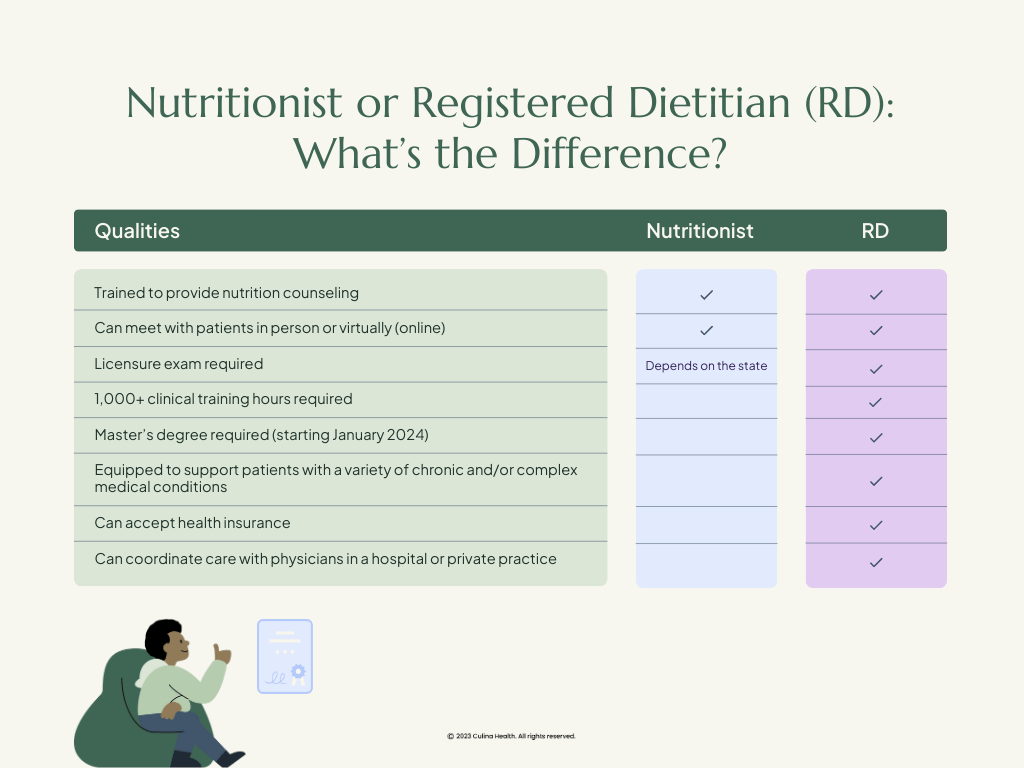If you’re looking to improve your health through diet and lifestyle modifications, but don’t know where to start, you’re not alone. When it comes to finding quality nutrition counseling from qualified professionals, many are left confused and without access to care, or unaware of their options.
The desire to connect those in need with qualified registered dietitians inspired co-founders Vanessa Rissetto and Tamar Samuels to create Culina Health. Rissetto calls out a particularly striking statistic, noting “42 percent of Americans are overweight or obese and 37 million Americans have diabetes; 1 in 5 don’t know they have diabetes and less than a quarter of a percent of them have ever seen a registered dietitian.” In an age of fad diets and unlicensed social media nutrition “gurus,” Culina Health is proud to be expanding access to personalized, science-based, and insurance-covered, clinical nutrition care throughout the country.
What is a registered dietitian?
Put simply, registered dietitians (or RDs) are healthcare professionals that have completed extensive nutrition education and 1,000+ hours of clinical training. They are also required to pass national board exams for licensure, and mandatory continuing education credits. Registered dietitians receive an NPI number (National Provider Identifier Number), which authorizes them to bill insurance for nutrition care. While there are a variety of settings a registered dietitian can work in, they are uniquely qualified to work in both in-patient and outpatient clinical settings, including hospitals, alongside physicians.
In contrast, nutritionists generally earn a certificate by taking some courses, and are not required to complete clinical hours. They may not even need to be licensed, but this varies state-to-state. Essentially, there is no national standard of hours of education, clinical training, or licensure to call yourself a nutritionist. The work of a nutritionist can be important and valuable, but since the title requires less rigorous training and clinical experience than that of a registered dietitian, nutritionists may not be as well equipped to support patient needs, including those with chronic illnesses, and other health complications that may require more complex clinical nutrition therapy.
Interested in working with a registered dietitian? Meet with a Culina Health RD online.

How do Registered Dietitians earn their credentials?
In order to sit for the CDR’s Registration Examination, aspiring dietitians must attend a program accredited by the Accreditation Council for Education in Nutrition and Dietetics (ACEND) and log 1,000+ hours of supervised clinical fieldwork. Starting in January 2024, all candidates will also be required to complete a master’s degree at minimum. After passing their board exam, RDs may also need to apply for state licensure. These layers of qualification (coupled with continuing education) guarantee a level of expertise and knowledge, enabling practitioners to provide science-based care to patients with a variety of health conditions and nutrition needs.
Commonly seen titles for Registered Dietitians
RD and RDN are interchangeable titles with the same requirements:
- RD – Registered Dietitian
- RDN – Registered Dietitian Nutritionist
The following acronyms indicate state-specific licensure. So for example, a provider may hold the title of RDN after passing the national Registration Examination as well as LDN after applying to practice in their state:
- CDN – Certified Dietitian Nutritionist
- LDN – Licensed Dietitian Nutritionist
- LRD – Licensed Registered Dietitian
The following acronyms indicate RDs that are specifically trained in preventative care and often work in public health settings:
- CNSC – Certified Nutrition Support Provider
There are also several credentials indicating additional certification for specific patient populations, including:
- CEDS – Certified Eating Disorder Specialist
- CDCES – Certified Diabetes Care and Education Specialist
- CSSD – Certified Specialist Sports Dietetics
- CSR – Certified Specialist Renal Nutrition
- CSO – Certified Specialist Oncology Nutrition
- CSP – Certified Specialist Pediatric Nutrition
Many RDs will also have master’s degrees in a related field, such as:
- Master of Science (MS) in Nutrition / Clinical Nutrition / Nutrition Science
- Master of Health Sciences
- Master of Health Science in Nutrition
- Master of Public Health
- Master of Professional Studies – Leadership in Nutrition
Why work with a Registered Dietitian?
A registered dietitian comes with clinical experience, diverse specialties, and the ability to accept insurance and coordinate care as they engage with you in-person or over a telehealth platform. Their training prepares them to provide nutrition guidance that is rooted in science rather than the latest diet fads, and their clinical knowledge allows them to collaborate with your primary care provider for a full picture of your health needs.
Fundamentally, says Samuels, “Registered dietitians are credentialed healthcare professionals who work with patients to provide medical nutrition therapy and behavior change support. We will educate you on how food affects your body and help you achieve your goals in a sustainable way.”
About Culina Health
Culina Health RDs are clinically-trained nutrition experts who will work with you to craft personalized, flexible, and sustainable nutrition and lifestyle plans. Our RDs are trained to provide culturally competent care, and cover a variety of specialties and approaches. Even better, one-on-one virtual nutrition care sessions with our registered dietitians are covered by most major health insurance providers.
Get more information or to schedule a virtual RD session.





